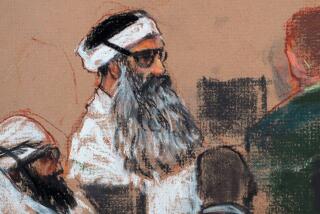Jet Bombing Co-Conspirator Sentenced
- Share via
NEW YORK — A man who plotted with the mastermind of the World Trade Center bombing to blow up 11 U.S. airliners over the Far East was sentenced Friday to life without parole plus 60 years.
Abdul Hakim Murad, 30, a commercial pilot who was born in Kuwait and lived in Pakistan, was found guilty along with Ramzi Ahmed Yousef, who was separately convicted of masterminding the World Trade Center bombing in 1993. Yousef is serving a sentence of life without parole.
U.S. District Judge Kevin T. Duffy also fined Murad $250,000 so he could not profit from the sale of his story.
Prosecutors said the men were radicals who had planned to bomb the airliners in retaliation for U.S. support of Israel.
Although the plot against the U.S. jets failed, Yousef did succeed in placing a bomb on a Philippine Airlines flight from Manila to Tokyo on Dec. 11, 1994, as a trial run. The bomb exploded under the seat of a Japanese passenger, killing him and injuring 10 other people.
Murad was sentenced for that passenger’s death and for plotting to down the 11 U.S. airliners in January 1995.
Yousef was accused of being the architect of the bombing scheme, which aimed to murder about 4,000 passengers over a 48-hour period as they returned on Delta, Northwest and United flights to the United States from the Far East.
Prosecutors alleged that Yousef recruited Murad and another co-defendant, Wali Kahn Amin Shah, to participate in the scheme. Shah has not yet been sentenced.
“The amazing thing to me is you devoted much of your life to learning to be a commercial pilot. Commercial pilots should be dedicated to making sure people don’t die,” the judge told Murad.
“After having attained what you wanted, a license to become a commercial pilot, you go about learning to blow up an airplane, how the airplanes were put together, where their weak points are.”
The plot was thwarted when Yousef bungled the mixing of bomb chemicals in a Philippines apartment he shared with Murad.
The apartment filled with acrid smoke and attracted police, who found chemicals, wires and a computer that contained terror plots.
Asked by a prosecutor about supervised release for Murad if he ever gets out of prison, the judge said: “Supervised release after life without parole is something that Allah will take care of. You don’t have to.”
Duffy said that because of Murad’s “terribly antisocial behavior,” he would recommend that he be placed in a maximum security prison.
More to Read
Sign up for Essential California
The most important California stories and recommendations in your inbox every morning.
You may occasionally receive promotional content from the Los Angeles Times.













